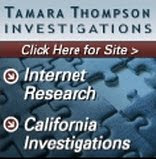No matter your occupation, if you care about access to information and you can be in Washington D.C. this Thursday, July 14, you are needed to help the National Council of Investigation and Security Services lobby Congress in order to secure private investigator's continued access to social security numbers and dates of birth. The database aggregators also must be able to store, and make available this personal data to PIs, in order for us to conduct the very investigations that are mandated by law. I conduct due diligence investigations, pursuant to court requirements, in real estate and probate matters, which would be severely affected if my access to personal identifiers was curtailed.
NCISS is getting some good media exposure for our issues but diligent reporters are always able to find investigators, who will broadcast, for the record, their disinterest in saving personal identifiers. Several examples appeared in today's Boston Globe:
NCISS is getting some good media exposure for our issues but diligent reporters are always able to find investigators, who will broadcast, for the record, their disinterest in saving personal identifiers. Several examples appeared in today's Boston Globe:
Dealing with identity theft
As database companies restrict access to Social Security numbers private investigators find it tougher to track down witnesses and missing persons
Before the ash settles on the current issues before Congress, the slash and burn privacy extremists are pressuring the Federal Trade Commission to establish a policy on the legality of securing telephone call logs without a subpoena. There's been a flurry in the press on this topic, which has primarily quoted EPIC but never any statutes. I reported on the Washington Post story here; the AP also ran with it. Here's a Google News list of reports, and the lazy WSJ story.
Granted, I haven't spent a lifetime searching for cases on this topic but a case that everyone should read addresses the situation in which an information broker (Action Research Group, Mike Lee), hired by a private investigator, impersonated a telephone company subscriber (Clemons) and obtained that subscriber's toll numbers via fax. [U. S. Court Of Appeals, 6th Circuit [2003 U.S. App. LEXIS 23547,*;82 Fed. Appx. 436ROGER CLEMONS, Plaintiff-Appellant, v. RANDALL WALLER, A ACTION AUTOLINER d/b/a ACTION RESEARCH GROUP, KARL HALL, and MERIDIAN RESOURCES & INVESTIGATIONS, Defendants-Appellees. No. 02-5342]
The Appellate opinion affirmed the district court's grant of summary judgment in favor of defendants, citing that Lee was a "party to the communication" and that it was not alleged that Lee (or any defendant) was intercepting a communication for the purpose of committing a crime or tort. A substantial issue was alluded to, but not addressed, in this opinion: "Defendants' conduct arguably may give rise to liability under other statutes or the common law, but it is not a violation of the ECPA." (Electronic Communications Privacy Act)
Prior cases in which the Supreme Court identified deceptive behaviors that were violations of law are listed. However, this case only considers whether the fraud constituted an unlawful interception, that is a wiretap.
Clemons characterizes the question presented as "whether it violates the [ECPA] for an imposter to acquire an individual's telephone records by using fraud and deceit to induce the transmission of these records by a telephone company, via facsimile, to the imposter by leading the telephone ... company to believe that the records were being requested by, and would be received by, the legitimate subscriber." (Appellant's Brief at 3.) This phrasing implies that the nature of the contents of the facsimile transmission (Clemons's phone records) is relevant--that is, that the fact that it was a telephone company sending telephone records makes this suit cognizable under the federal wiretap act. This fact is immaterial. The only relevant question is whether an unlawful interception occurred. The nature of the contents of the transmission has no bearing on this question whatsoever.Not only did the defendants not intercept a telephone call but the wiretap provision [18 U.S.C. § 2510(5)] specifically exempts "any telephone or telegraph instrument, equipment or facility, or any component thereof. (i) furnished to the subscriber [*8] or user by a provider of wire or electronic communication service in the ordinary course of its business and being used by the subscriber or user in the ordinary course of its business ..."
An unexplored aspect of the trial court case that future litigation might address, would have a significant bearing on the legality of impersonating a subscriber.
The district court assumed without deciding that the fax transmission was an electronic communication protected by the statute. Appellees do not contest that assumption. The district court then granted summary judgment on two grounds: first, on the ground that Lee's fax machine was subject to the "ordinary course [*9] of business" exception provided by 18 U.S.C. § 2510(5), and second, on the ground that Lee was subject to the "party to the communication" exception provided by 18 U.S.C. § 2511(2)(d). The district court correctly analyzed the "party to the communication" exception and properly applied it to this case. We affirm the district court's judgment on this basis alone and therefore need not consider the issue of whether the receipt of the communication over Lee's fax machine met the "ordinary course of business" exception.




